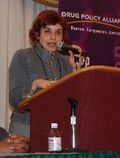Below is an article I recently wrote for the excellent European drug policy reform organisation, European Coalition for Just and Effective Drug Policies — ENCOD. And here is the link to the original on the ENCOD website.
I have had the honour of serving as the European Director of Law Enforcement Against Prohibition (LEAP) for the last four years, and have been thrilled to oversee the establishment of thriving national groups in the UK and Germany, with the possibility of more on the horizon. In my view, law enforcement offers a unique and critical voice to the international drug policy reform debate.
LEAP, founded in 2002, today has over 150,000 supporters and speakers in 20 countries. We consist of police officers, lawyers, judges, prison governors, probation officers, intelligence and military personnel, and even international drug czars. What unites us is a shared professional knowledge, experienced across the full spectrum of law enforcement, that drug prohibition has egregiously failed.
Over the last 50 years global drug use has exponentially increased, the potency of illegal drugs has increased, they are ubiquitously available, and the price of street drugs has gone through the floor. Faced with this information, how can our governments claim they are winning the “war on drugs” to create a “drug free world”?
Quite the opposite – prohibition has enabled a global and exponentially growing black market.
I became aware of drug prohibition failure while I was working for MI5 back in the 1990s. One of my postings involved investigating terrorist logistics, which meant that I had to work closely with UK Customs across the UK. This experience made me aware that the “war” had been lost. It also made me very aware, early on, that there was a massive overlap between the illegal drug market and terrorist funding.
The US DEA estimates that over half the designated terrorist groups around the world gain the bulk of their funding from drugs money. So on the one hand prohibiting drugs and fighting the “war on drugs” sends the market underground and the resulting massive profits provide a key revenue stream to terrorists, not least ISIS which controls part of the flow of heroin from central Asia into Europe. On the other hand the West is also waging the “war on terror” to fight these same groups.
So what our governments give the military-security complex with one hand, they also give with the other.
But is not all bad news. Countries in Latin America and states in North America are legalising cannabis, safe injection rooms have rolled out across Europe, Canada is looking to legalise cannabis, and the decriminalisation of drugs has been hugely successful in countries such as Portugal and the Czech Republic.
Even at the UN level, which recently held a once-in-a-generation General Assembly Special Session in New York, the concept of harm reduction is at least now being tabled by some countries, although the progress is glacial.
The times may not be changing fast enough for many of us in the drug policy reform world, despite baby steps being made in the right direction by some countries. Yet even the more progressive countries within the international community are still constrained by the legal straight jacket that is the UN drug treaty framework.
And while harm reduction is good progress in that it no longer criminalises those who choose to use, it utterly fails to address the bigger problem that I mentioned before: that the criminalisation of certain drugs drives the market underground, providing huge profits to organised crime cartels and terrorist groups around the world every year. Prohibition has unleashed the biggest crime wave the world has ever seen. As with alcohol prohibiton in 20th century America, only legalisation and regulation will remove this market from the greedy grasp of criminals.
I have just watched a old BBC Newsnight debate between comedian and actor, Russell Brand, and right-wing writer and commentator, Peter Hitchens. The debate encapsulated the entrenched positions of both the reformist and prohibitionist camps. The former was represented by Brand, a former drug user in recovery, advocating abstinence-based therapy. The latter by Hitchens, an anti-drug warrior largely approaching the issue from a morality position, who argued that taking drugs is a crime and that all such crimes should be prosecuted as a deterrence.
While naturally I lean more towards the position of Brand, who two years ago electrified a rather turgid annual UN Commission on Narcotic Drugs meeting in Vienna by calling for full drug legalisation, and also while respecting his personal experiences, I do think he’s missing a trick.
Yes, those with drug dependencies need help and compassion not prison, but the vast majority of those who choose to use do so recreationally, just for fun, and never develop an addiction, just as only a minority of those who choose to drink go on to develop alcoholism. And yet the parameters of the drug debate rarely stray beyond the well-worn issue of “problem” users, both amongst reformist as well as prohibitionist circles. We do not call all drinkers alcoholics so why, in the public discourse, are all users of other drugs clumped together as “addicts” in high-profile debates?
As for Hitchens, I remain baffled. He seems to think that all laws are immutable, graven in stone with words from on high, and as such must therefore be strictly enforced. This is tosh. All laws change and evolve to reflect the changing mores of the societies which write them. If this were not to happen, we in the West would still burn witches, own slaves, not allow women to vote, outlaw homosexuality and, in America of course, alcohol would remain prohibited. Yet now, all these outdated, unjust, and cruel laws have been swept away,
In 2014 LEAP published a Proposed Amendment of the UN Treaties, in which we argue that all drugs should be brought within the orbit of the World Health Organisation Framework Convention on Tobacco Control (2003). We argue that only full regulation and control of the drug market will end the scourge of the illegal global drug trade. Until this happens at least $320 billion per year profits will continue to benefit only crime cartels and terrorist organisations.
The “war on drugs” has failed.
Albert Einstein, who was not exactly a dullard, said that the very definition of insanity was to continue to do the same thing, even if it repeatedly fails, in the hope that you will eventually get a different outcome. That is what we are seeing with prohibition.
It is time for this insanity to cease.
 The
The 


 Richard Van Wickler, a currently-serving jail superintendent who will be representing Law Enforcement Against Prohibition (
Richard Van Wickler, a currently-serving jail superintendent who will be representing Law Enforcement Against Prohibition ( Former Chicago drug prosecutor James Gierach, recently a featured speaker at a conference in Mexico City last month attended by the first lady of Mexico and the former presidents of Colombia and Brazil, says, “The unending cycle of cartel violence caused by the prohibition market has turned a steady trickle of former elected officials criticizing prohibition into a flood of sitting presidents, business leaders and law enforcement officials calling for an outright discussion about legalization. It’s time for the U.S. and the U.N. to acknowledge that legal control, rather than criminalization, is a much better way to manage our drug problems. The world can have either drug prohibition, violence and corruption or it can have controlled drug legalization with safe streets and moral fabric, but it can’t have both.”
Former Chicago drug prosecutor James Gierach, recently a featured speaker at a conference in Mexico City last month attended by the first lady of Mexico and the former presidents of Colombia and Brazil, says, “The unending cycle of cartel violence caused by the prohibition market has turned a steady trickle of former elected officials criticizing prohibition into a flood of sitting presidents, business leaders and law enforcement officials calling for an outright discussion about legalization. It’s time for the U.S. and the U.N. to acknowledge that legal control, rather than criminalization, is a much better way to manage our drug problems. The world can have either drug prohibition, violence and corruption or it can have controlled drug legalization with safe streets and moral fabric, but it can’t have both.” Also attending the conference on behalf of
Also attending the conference on behalf of 